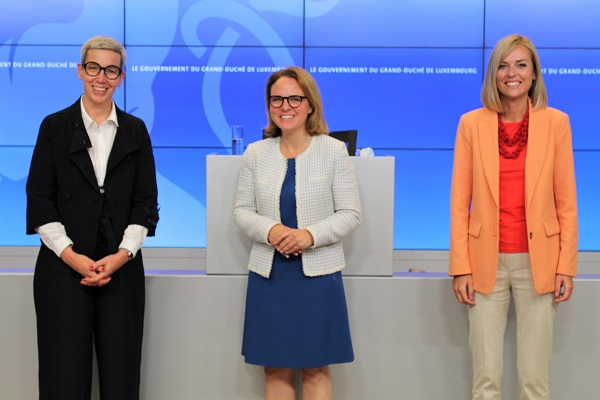 L-R: Sam Tanson, Minister of Justice; Corinne Cahen, Minister for Family Affairs and Integration; Taina Bofferding, Minister for Home Affairs;
Credit: MINT
L-R: Sam Tanson, Minister of Justice; Corinne Cahen, Minister for Family Affairs and Integration; Taina Bofferding, Minister for Home Affairs;
Credit: MINT
Luxembourg has dropped its five-year residency requirement for foreign nationals wishing to vote in municipal elections.
On Thursday 2 September 2021, Luxembourg's Minister for Family Affairs and Integration, Corinne Cahen, the Minister for Home Affairs, Taina Bofferding, and the Minister of Justice, Sam Tanson, presented the changes for the 2023 municipal elections, which will take place on 11 June 2023.
The date of the next municipal elections has been pushed forward since the national elections are set to take place in October 2023.
"The municipalities are the heart of our democracy. Decisions made on this level directly affect our citizens, and consequences are felt in everyday life. Therefore, we must enable our entire population to participate in municipal elections and become active in local politics! This is a clear priority for this coalition!", noted Home Affairs Minister Taina Bofferding.
The advancement of the municipal elections means that certain provisions of the municipal law must be adapted in order to guarantee legal certainty. In addition, the means of determining the number of local council members in each municipality will be adapted. As requested by several municipalities, the National Registry of Natural Persons (Registre national des personnes physiques - RNPP) will henceforth serve as reference basis to determine the number of council members.
Participation of non-Luxembourg nationals
In order to facilitate access to voting for foreign nationals, and thus allow all residents the possibility of participating in municipal elections, the Luxembourg Government has decided to abolish the five-year residency requirement for all non-Luxembourg citizens, whether they are European or from a third country.
Family Affairs Minister Corinne Cahen explained that in future every resident will be eligible to vote in local (and European) elections, regardless of how long they have lived in a municipality.
According to figures from the Ministry of Family Affairs, Integration and the Greater Region and the Centre for Intercultural and Social Studies and Training (Centre d'études et de formations interculturelles et sociales - CEFIS), 33% of residents (i.e. 75,226 people) were unable to register to vote before the 2017 elections because they had not lived in the Grand Duchy for at least five years.
Minister Corinne Cahen stressed the importance and impact of this change: "People get the right to vote as soon as they arrive in their municipality. They can immediately participate in political life and they can integrate more easily by taking an interest in the political decisions that affect their lives".
Another important change to increase political participation concerns the deadline for non-Luxembourg nationals to register to vote. The government aims to extend the deadline for foreign nationals to register to vote by 32 days. As such, the last day of registration on the electoral roll, and thus the day of the provisional closure of the roll, will be postponed from the 87th to the 55th day before the elections.
Introduction of an accelerated appeal procedure before the Administrative Court
Persons who are unsuccessful in their complaints about their registration on the electoral roll with the Mayor and Aldermen's Council have the possibility of lodging an appeal with the Administrative Court. In order to enable potential applicants to obtain a decision on their application as quickly as possible, an accelerated procedure has been introduced, as already exists for administrative detention matters. The Administrative Court will now hand out its decision within ten days (instead of the current 21 days) after the application has been submitted.
Justice Minister Sam Tanson emphasised the importance of reducing registration deadlines as much as possible: "In order to facilitate the registration of non-Luxembourg nationals on the electoral roll, we have introduced an accelerated procedure with the Administrative Court. This measure will save a considerable amount of time for the entire required registration process. Our ultimate goal remains to include our non-Luxembourg citizens in the democratic process, because we consider the right to vote to be an essential factor of integration".








